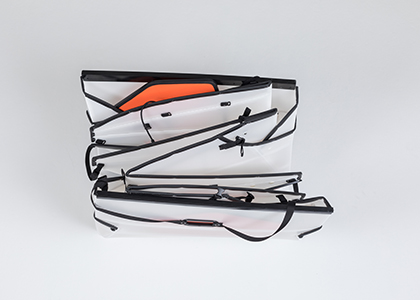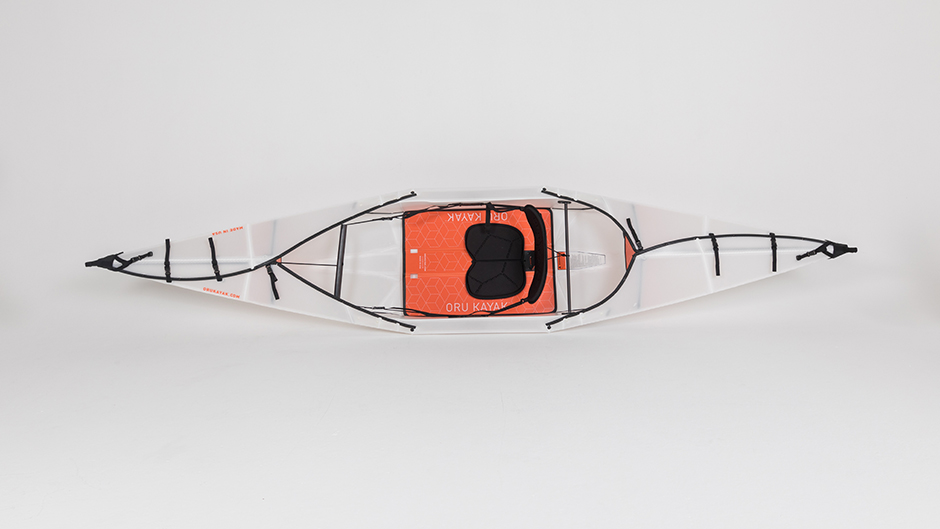
going with the FLOW
When you ask alumnus Ardy Sobhani, economics ’04, if he feels like he has the hang of this whole CEO thing yet, his answer is somewhat surprising.
“I 100 percent make it up as I go. If I don’t know an answer I’ll just go find it.”
Then again, as someone who has to put out metaphorical fires every day for a living, maybe it isn’t so surprising. In fact, Sobhani has always had a pretty relaxed attitude toward his future. Not to say he doesn’t take his work seriously; his approach is simply less about structure and more focused on being open to opportunities. And, as the CEO of Oru Kayak, a company that makes unique and easily transportable kayaks (despite having never ridden in one before he took the gig), his “go with the flow” attitude is particularly fitting.
“My first experience in a kayak was in an early prototype Oru back in 2012 under the Golden Gate Bridge,” he says. “It made me feel connected to nature and gave me a sense of freedom and oneness. I’ll never forget that moment.”
Sobhani is now in his fifth year as the cofounder and CEO of the Bay Area-startup that makes foldable, lightweight kayaks inspired by the Japanese art of origami.
And, as his company’s distinctive product line suggests, he’s always been one to shun tradition in favor of creativity – with some strategically placed goals along the way. As an undergrad, he chose a major in economics that provided stable career opportunities, along with a minor in digital arts that let him test his creativity.
He went on to get an unconventional MBA in design strategy, merging his business acumen with his love of design, and even though he never set out with the goal of running a company, he’s gotten his team past the aspirational five-year mark and is heading toward expansion. What started as a twoperson operation with co-founder Anton Willis now boasts more than 30 employees including their LA-based manufacturers. Not bad for a “see what happens” approach.
“My favorite thing about the job is the unknown and solving lots of hard challenges,” Sobhani says. “The ambiguity of the solutions or directions we take. I love that. I love that about life. I think when things become too steady it gets a little boring.”
He’s been that way since his days at UCI. Even as his peers stressed over setting up the perfect plan to get them to their dream job, Sobhani didn’t have a set career goal in mind. Instead, he decided to see where the journey took him and enjoy his education. He excelled in his studies, making the dean’s list and serving as a member of the economic and business society, while making sure to take advantage of extracurriculars like studying abroad in Germany.
“If you’re going to be in college, you might as well maximize your experience and get the very most out of it that you can,” he says. “It’s all about making connections. Getting to know people and creating relationships, you never know what those things can become.”
With that mindset, it’s not a surprise that when he found himself with a bachelor’s degree and working in the mortgage industry, he couldn’t help but feel that something wasn’t right.
“I worked there for five years, and after a couple years I realized I wasn’t growing that much and I ended up getting sucked into the comfort of the corporation,” he says.
I think when things become too steady, it gets a little boring.
He says that it’s not necessarily bad to become comfortable in a role, but for him, he wanted a challenge.
He wanted to be using those problemsolving skills he was able to utilize while getting his economics degree, and maybe explore some more creative avenues. He fluctuated for a while between whether he should get an MBA or an MFA, but ended up finding a combination graduate program at the California College of Arts that gave him the best of both worlds. And then the Oru Kayak opportunity came along.
Now he spends his days making sure his employees are able to operate to the best of their abilities. It’s a new kind of problem solving, but one that he enjoys.



“The fun part when we first started out was just building everything – building a factory, building the finance side of things, solving the product issues and problems, and figuring out how to make the product better,” he says. “Nowadays my main job is to open the road to make sure people can do their job well and make sure they’re happy, satisfied, engaged. So there’s still never a boring day.”
For those looking to venture into the world of entrepreneurship like he did, his advice is to let go of your ego and be willing to work.
“Forget about the title,” he says. “Don’t worry about ‘being a CEO.’ You need to show up every day and you need to work and do whatever it takes to get the job done.”
And of course, give it everything you’ve got. “You never want to think you missed out on something. That’s life in general. I want to skip across that finish line, doors hanging off the car, engine broken, just having gone full out.” ●


connect with us: